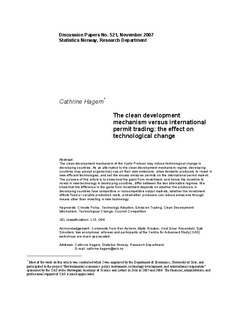| dc.contributor.author | Hagem, Cathrine | |
| dc.date.accessioned | 2011-11-07T22:14:25Z | |
| dc.date.available | 2011-11-07T22:14:25Z | |
| dc.date.issued | 2007 | |
| dc.identifier.issn | 1892-753x | |
| dc.identifier.uri | http://hdl.handle.net/11250/180205 | |
| dc.description.abstract | Abstract:
The clean development mechanism of the Kyoto Protocol may induce technological change in developing countries. As an alternative to the clean development mechanism regime, developing countries may accept a (generous) cap on their own emissions, allow domestic producers to invest in new efficient technologies, and sell the excess emission permits on the international permit market. The purpose of this article is to show how the gains from investment, and hence the incentive to invest in new technology in developing countries, differ between the two alternative regimes. We show that the difference in the gains from investment depends on whether the producers in developing countries face competitive or noncompetitive output markets, whether the investment affects fixed or variable production costs, and whether producers can reduce emissions through means other than investing in new technology.
Keywords: Climate Policy, Technology Adoption, Emission Trading, Clean Development Mechanism, Technological Change, Cournot Competition | no_NO |
| dc.language.iso | eng | no_NO |
| dc.publisher | Statistics Norway, Research Department | no_NO |
| dc.relation.ispartofseries | Discussion Papers;No. 521 | |
| dc.subject | Climate policy | no_NO |
| dc.subject | Emission trading | no_NO |
| dc.subject | Technological changes | no_NO |
| dc.subject | JEL classification: L13 | no_NO |
| dc.subject | JEL classification: Q54 | no_NO |
| dc.title | The clean development mechanism versus international permit trading: the effect on technological change | no_NO |
| dc.type | Working paper | no_NO |
| dc.subject.nsi | VDP::Social science: 200::Economics: 210::Economics: 212 | no_NO |
| dc.subject.nsi | VDP::Mathematics and natural science: 400::Geosciences: 450 | no_NO |
| dc.source.pagenumber | 22 s. | no_NO |
